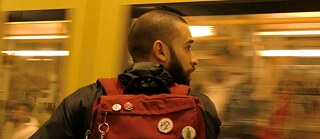MIX NYC Presents: Dispatches from Berlin’s Queer Utopia/Dystopia

07/15/2024
7:00pm EDT
Goethe-Institut New York
30 Irving PlaceNew York, NY 10003
Details
Language: German with English subtitlesPrice: Free admission
+1 212 4398700
gfo-newyork@goethe.de Registration is required for this event
Related links
Co-presented with MIX NYC
MIX NYC presents a screening of queer experimental films from our comrades in Berlin. In this cinematic glimpse of one of our favorite European daydreams, Berlin-based artists explore the city’s social fabric through yearnings of the promise of utopia. As the realities of life and the austere state of the world seep in to reveal isolation, loneliness, and loss, perhaps an optimistic look to the future or a nostalgic recognition of the activism of the past will offer hope to fuel our intersectional struggles and stand in solidarity with one another?
Register
After the fall of the Berlin wall, residents of the former East left their homes quickly, fearing the announcement was a mistake, and businesses found they could not sustain themselves in competition against the capitalist-savvy West. This left many abandoned buildings, which provided an opportunity for those with radical political ideas to establish autonomous spaces, queer communists and neo-fascists alike. Tuntenhaus was one of those spaces. Juliet Bashore’s two-part documentary of the struggles faced by the Tuntenhaus autonomous community of drag queens opens this screening (The Battle of Tuntenhaus, 1991). Part one covers the confrontations with neighboring neo-Nazis, as well as the eviction from Mainzer Strasse in the neighborhood of Friedrichshain. Two years later, Bashore returns to Berlin to reconnect with some of the former residents, who are in the process of re-establishing their community on Kastanienallee in Prenzlauer Berg, which is where they still are today. In recent months, their existence was yet again threatened by eviction, but luckily the state of Berlin has a law that can prevent the sale of a historic building to private investors, and the district chose to implement it and make the building publicly owned (https://www.kastanie86.net).
Over the last 20 years, autonomous spaces in Berlin have been dwindling, with evictions making room for co-working cafés and high-priced lofts for part-time accommodation of upper middle-class Europeans and North Americans on tourist visas. Berlin’s low-income population of working-class Germans and immigrants fleeing poverty, war, or stringent anti-queer laws stands no chance against these rising rents. Leandro Goddinho and Paulo Menezes’ film is representative of so many newcomers’ experiences when looking for a place to live (Du bist so wunderbar (Paradise Europe), 2023). Not only is it challenging to find a place that is affordable, but the fact that one needs to register where they live to find a job, go to school, or be a functioning part of society makes it nearly impossible. Cheap rent is mostly found through illegal sublets. Neoliberal capitalism is now in full swing, ready to crush anyone not able to fit its mold.
The last two films of the screening explore how we, as queers, manage to find solidarity and community amongst the ruins. Harvey Rabbit takes us on a journey through Berlin’s darkrooms as a space of healing (Chemo Darkroom, 2018). Featuring performances by the well-known and adored Bishop Black, Theo Meow, and Finn Peaks from Berlin’s queer porn community, Rabbit’s film is not only a story about the experience of survival, but a poetically sexy tribute to it as well. The program ends with a film from Berlin-born filmmaker Zara Zandieh (Octavia’s Vision, 2020). Drawn from the writings of Afro-futurist author Octavia Butler, Zandieh’s film showcases the new style emerging in queer futurist European cinema which combines archival footage with tableaux to provide a look back while looking forward, a sort of timelessness that reimagines what our futures could be. Zandieh makes clear that the goal is not to gain material wealth, but to recognize our common struggles, to be in solidarity with one another despite our differences. To love, to form community, and to care for each other in the face of austerity and the growing turn to the right. Berlin stays poor, but sexy!
Films:
Juliet Bashore, The Battle of Tuntenhaus (1991, 45 min)
Leandro Goddinho & Paulo Menezes, Du bist so wunderbar (Paradise Europe) (2023, 17 min)
Harvey Rabbit, Chemo Darkroom (2018, 17 min)
Zara Zandieh, Octavia’s Visions (2020, 18 min)
MIX NYC is the longest-running queer film festival in NYC, and has presented experimental film, video and installation art. Established in 1987, at the height of the AIDS epidemic by Jim Hubbard and Sarah Schulman, the DIY festival was organized in response to experimental film venues in New York City not programming contemporary work made by LBGT filmmakers. As the nonprofit home of the annual New York Queer Experimental Film Festival and the ACT UP Oral History Project, MIX NYC has featured early works by filmmakers such as Christine Vachon, Todd Haynes, Isaac Julien, Thomas Allen Harris, Barbara Hammer, Juan Carlos Zaldivar, Jonathan Caouette, Jennie Livingston, Gus Van Sant, and Matthew Mishory. After a hiatus of a few years, MIX NYC is back with monthly screenings that are dedicated to creating a cultural community where contemporary queer experimental filmmakers can exhibit and garner support for their work.